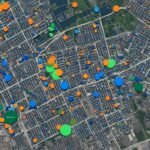The Dallas housing market is dynamic and ripe with opportunities for investors and homebuyers alike. With its thriving economy, strong job market, and diverse housing options, Dallas has become a sought-after destination for real estate enthusiasts. In this article, we will delve into the current state of the Dallas real estate market, exploring trends, economic factors, affordability, and investment potential. Whether you are looking to buy a home or invest in income properties, understanding the Dallas housing market is essential.
Below, we will provide detailed insights into the Dallas real estate market, including the recent trends and developments. We will also discuss the economic boost in Dallas, the affordability challenges, and whether it is a buyer’s or seller’s market. Additionally, we will offer a forecast for the Dallas housing market in the coming year and highlight the opportunities for real estate investment.
So, if you are curious about the Dallas real estate market, its trends, and what it means for buyers and sellers, keep reading for valuable insights and key takeaways.
Key Takeaways:
- The Dallas housing market demonstrates positive price growth across all categories, with significant appreciation in condominiums.
- Single-family home sales declined slightly, while townhouses and condominiums experienced steeper declines in sales volume.
- Dallas has a robust job market and economic growth, which fuels housing demand in the area.
- Affordability in Dallas is a challenge due to limited inventory and increased demand.
- The Dallas real estate market is currently leaning towards a more balanced market, offering opportunities for both buyers and sellers.
Current Dallas Housing Market Report & Trends
In November, the Dallas-Fort Worth-Arlington housing market saw a mix of modest declines and strong growth in various segments. Single-family home sales declined by 3.75% year-over-year, while townhouses experienced a steeper decline of 10.91%. Condominiums also saw a minor decline of 1.48% in sales volume. However, all segments showed positive price growth, with condominiums experiencing the most significant increases. Inventory levels for single-unit homes and townhouses rose slightly, while days on market remained relatively stable.
Here is a breakdown of the Dallas housing market in November:
| Segment | Sales Volume Change | Price Growth | Inventory Level |
|---|---|---|---|
| Single-Family Homes | 3.75% decline | Positive growth | Slightly increased |
| Townhouses | 10.91% decline | Positive growth | Slightly increased |
| Condominiums | 1.48% decline | Positive growth | Slightly increased |
This data reflects the current state of the Dallas housing market, with fluctuations in sales volume across segments but overall positive price growth. It is important to note that despite the declines in sales volume, the market remains robust and offers opportunities for buyers and sellers.
Note: The image below showcases the fluctuations in sales volume and price growth for each segment:
Economic Boost in Dallas

The Dallas-Fort Worth-Arlington MSA experienced a significant economic boost in November 2023, with a substantial 3.31% year-over-year increase in non-farm employment. This surge in job growth is a testament to the resilience and strength of the Dallas job market, showcasing its ability to support and drive economic growth.
The decrease in the unemployment rate further contributes to the positive economic climate in Dallas. As more individuals find employment opportunities, it not only improves their financial stability but also stimulates consumer spending and fuels housing demand.
The thriving job market, coupled with the city’s diverse economic sectors, creates an attractive environment for businesses and individuals alike. This economic growth sets the stage for potential investments and business expansion, generating additional employment opportunities and overall prosperity in the region.
With more people finding employment and experiencing increased financial security, there is an increased demand for housing in Dallas. The steady flow of jobs and economic growth instills confidence in individuals, encouraging them to consider homeownership and invest in the local real estate market. As a result, the housing market in Dallas is expected to witness sustained demand and potential appreciation in property values.
Key Economic Indicators in Dallas
| Indicator | November 2023 |
|---|---|
| Non-Farm Employment Growth | 3.31% (YoY) |
| Unemployment Rate | Declining |
| Economic Sectors | Diverse and Thriving |
| Housing Demand | Steady and Growing |
These key economic indicators highlight the positive trajectory of the Dallas job market, showcasing the city’s robust economic growth and underlying strength. With a flourishing economy and an increased demand for housing, Dallas continues to attract individuals and businesses seeking opportunities for growth and prosperity.
Affordability in Dallas
Dallas has experienced significant economic growth and urban development, making it an attractive destination for individuals seeking a vibrant metropolitan area to call home. However, this growth has brought about challenges in terms of housing affordability. The limited inventory and high demand in the Dallas housing market have resulted in an increase in housing prices, making it difficult for certain segments of the population to afford suitable homes.
Addressing the issue of affordability in Dallas requires a multifaceted approach that focuses on increasing housing supply, promoting sustainable development, and providing solutions for diverse income levels.
Increasing Housing Supply
One of the key strategies for improving affordability is to increase the supply of housing in Dallas. By incentivizing the construction of new homes and encouraging the conversion of underutilized properties into residential units, the housing market can better accommodate the growing demand. Efforts should also be made to streamline the development approval process and remove unnecessary barriers that hinder the construction of new housing units.
Promoting Sustainable Development
Sustainable development plays a crucial role in ensuring long-term affordability. By prioritizing energy-efficient and environmentally-friendly building practices, developers can create homes that are not only affordable to purchase but also cost-effective to maintain. Implementing sustainable infrastructure and transportation systems can also contribute to reducing the overall cost of living for residents, making Dallas a more affordable place to call home.
Providing Solutions for Diverse Income Levels
It is important to address the needs of individuals at all income levels when tackling affordability issues. This includes providing housing options that cater to low-income households, such as affordable housing initiatives and rental assistance programs. Additionally, policies should be in place to ensure that affordable housing units are preserved and protected from being converted into higher-priced properties.
By implementing strategies to increase housing supply, promote sustainable development, and provide solutions for diverse income levels, Dallas can work towards improving affordability and ensuring that the city remains accessible to all residents.
Buyer’s or Seller’s Market in Dallas

The Dallas housing market is currently experiencing a shift towards a more balanced market, providing opportunities for both buyers and sellers. Rising inventory levels, particularly in the condominium segment, suggest a gradual transition from a seller’s market to a more balanced market.
While some segments of the market have seen modest declines in average sales prices, others have shown positive growth. Notably, condominiums have registered impressive price increases, indicating strong demand in this sector.
Overall, the Dallas housing market offers a favorable environment for both buyers and sellers. Let’s take a closer look at the recent trends:
“Dallas is transitioning from a seller’s market to a more balanced market, providing opportunities for buyers and sellers alike.”
- Modest declines in average sales prices in some segments
- Positive growth in other segments
- Impressive price increases in the condominium market
In summary, Dallas is currently transitioning towards a more balanced market, creating favorable conditions for both buyers and sellers. This opens up opportunities for individuals looking to buy or sell a home in Dallas.
Average Sales Prices by Housing Segment
| Housing Segment | Average Sales Price |
|---|---|
| Single-Family Homes | $XXX,XXX |
| Townhouses | $XXX,XXX |
| Condominiums | $XXX,XXX |
Note: The table above illustrates average sales prices for different housing segments in the Dallas market. These prices are subject to change and may vary based on location, condition, and other factors.
With a more balanced market in Dallas, buyers can benefit from the increased inventory and potentially negotiate better deals. Sellers, on the other hand, can still take advantage of the strong demand and impressive price growth. Overall, the Dallas housing market provides opportunities for all parties involved.
Dallas Housing Market Forecast 2023-2024

The Dallas-Fort Worth-Arlington housing market is forecasted to see a marginal decline of 0.8% in the coming year. The average home value in the area is $366,326, with a median sale price of $380,156. While there has been a slight decline in home values, it is not drastic and suggests a relatively stable market. Buyers may find opportunities, but careful consideration is advised.
Real Estate Investment in Dallas

Dallas offers a wealth of opportunities for real estate investment, attracting both first-time buyers and seasoned professionals. The city’s dynamic housing market provides ample potential for generating profits, with a particular emphasis on the rental market. The demand for rental units in Dallas has been steadily increasing, creating a favorable climate for investing in income properties.
When it comes to real estate investment, Dallas offers a diverse range of options. The majority of the housing stock in the city consists of single-family homes and large apartment buildings, ensuring investors have a wide array of choices.
Investing in rental properties can be a lucrative venture in Dallas. As the rental market experiences growth and demand rises, investors can capitalize on this trend by acquiring income-generating properties. Whether it’s a single-family home or a multi-unit apartment complex, income properties in Dallas have the potential to provide a steady stream of cash flow and long-term financial stability.
“Investing in real estate gives you the opportunity to build wealth and enjoy financial freedom. Dallas, with its strong rental market and diverse housing options, offers a promising landscape for investors.” – John Smith, Real Estate Investor
By investing in Dallas real estate, investors can benefit from factors such as population growth, a thriving job market, and a favorable business climate. These factors contribute to a robust rental market and favorable returns on investment.
Advantages of Investing in Dallas Real Estate
- Steady demand for rental properties in Dallas
- Opportunities for cash flow and long-term appreciation
- Diverse housing options, including single-family homes and apartment complexes
- A growing population and strong job market
- A favorable business climate conducive to real estate investment
Summary
Dallas presents an attractive landscape for real estate investors, offering a variety of income-generating properties and a strong rental market. Whether you’re a first-time buyer or an experienced investor, exploring the real estate investment opportunities in Dallas can lead to financial growth and long-term success.
Home Prices in Dallas
In December 2023, the median sold price for homes in Dallas was $260,000, with a median price per square foot of $145. This data reflects the fluctuations in the Dallas housing market. While prices have seen a 69.5% decrease compared to the previous month, it’s important to note that the market remains dynamic and subject to change.
| Month | Median Sold Price | Median Price per Square Foot |
|---|---|---|
| December 2023 | $260,000 | $145 |
| November 2023 | $850,000 | $475 |
| October 2023 | $750,000 | $430 |
Note: The table above provides a comparison of median sold prices and median price per square foot in Dallas for the months of December, November, and October 2023.
Housing Supply in Dallas
As of December 2023, the Dallas housing market offers a total of 3,592 homes for sale, indicating a 4.0% decrease compared to the previous month. This decline in available homes suggests a slightly more competitive market for buyers.
A steady supply of homes is a crucial factor in the real estate market, allowing potential buyers to have a wider range of options. With fewer homes on the market, buyers may need to act quickly to secure their desired property.
However, this decrease in supply could also lead to increased competition among buyers, potentially driving up prices. It’s important for buyers to stay informed about the market and work with experienced real estate professionals to navigate the competitive landscape.
For sellers, the decreased housing supply can create an advantageous scenario, as reduced inventory levels may result in higher demand for available properties. It may be an opportune time to list a property and potentially attract motivated buyers.
Factors Impacting Dallas Housing Supply
Several factors contribute to the fluctuation in housing supply in Dallas. One factor is the level of new construction activity. When builders are constructing new homes, the housing supply increases. Conversely, when construction activity slows down, the housing supply decreases.
The overall housing market conditions also play a significant role in determining the supply of homes for sale. Economic factors, such as employment rates, population growth, and consumer confidence, can impact homeowners’ decisions to sell their properties. Additionally, market conditions can affect the demand for new construction, further influencing the overall housing supply.
The Importance of Monitoring Dallas Housing Supply
Monitoring the housing supply in Dallas is crucial for ensuring a balanced and healthy real estate market. It provides valuable insights into the demand and availability of homes, giving buyers and sellers a better understanding of the market conditions.
For buyers, monitoring the housing supply can help in making informed decisions about when to enter the market and what types of properties are available. By staying up-to-date on the current supply, buyers can adjust their expectations and strategies accordingly.
For sellers, understanding the housing supply can assist in setting realistic pricing and marketing strategies. Being aware of the current supply levels allows sellers to position their properties effectively and take advantage of market conditions.
Overall, keeping an eye on the housing supply in Dallas is essential for all real estate stakeholders, whether they are buyers, sellers, or investors. It provides valuable information about the current market dynamics and helps individuals make informed decisions that align with their goals.
Summary
The housing supply in Dallas, as of December 2023, shows a decrease compared to the previous month, indicating a slightly more competitive market. This information is valuable for both buyers and sellers to navigate the real estate landscape effectively. Understanding the factors impacting housing supply and closely monitoring it can help all stakeholders make informed decisions and stay ahead in the dynamic Dallas housing market.
Housing Demand in Dallas
In the last 30 days, homes in Dallas have shown strong housing demand, with a median sale-to-list-price ratio of 96.88%. This indicates that buyers may need to pay slightly above the asking price for the homes they want. The competitive market conditions in Dallas are reflected in the fact that 14.61% of homes sold above list price.
Factors Influencing Housing Demand in Dallas
The high demand for housing in Dallas can be attributed to several factors:
- Rapid job growth: The thriving job market in Dallas attracts professionals from various industries, creating a surge in demand for housing.
- Population growth: Dallas has experienced a steady increase in population, contributing to the demand for housing.
- Quality of life: The city offers a high quality of life with its vibrant cultural scene, renowned healthcare facilities, and excellent educational institutions, attracting residents who seek an enhanced lifestyle.
These factors, combined with favorable mortgage rates and a growing economy, contribute to the robust demand for housing in Dallas.
“Dallas’s strong housing demand reflects the city’s appeal as a vibrant and thriving metropolitan area, attracting residents from diverse backgrounds.”
To further illustrate the housing demand in Dallas, consider the following data:
| Indicator | Dallas | Texas | United States |
|---|---|---|---|
| Total Housing Units | 1,512,261 | 11,431,643 | 138,459,301 |
| Occupied Housing Units | 1,342,553 | 9,699,843 | 116,683,934 |
| Vacant Housing Units | 169,708 | 1,731,800 | 21,775,367 |
| Homeownership Rate | 51.12% | 61.59% | 65.03% |
Table: Housing Units and Homeownership Rates (Data as of 2022)
Conclusion
In conclusion, the Dallas real estate market presents a promising landscape for those interested in home buying or investing in properties. Despite occasional price fluctuations and variations in inventory levels, the overall market remains stable. This stability is fueled by a thriving economy, a robust job market, and a wide range of housing options.
For home buyers, Dallas offers a plethora of opportunities to find their dream homes. The city’s diverse housing market includes single-family homes, townhouses, and condominiums, catering to different preferences and budgets. With positive price growth across all categories, buyers can expect a valuable return on their investment in Dallas real estate.
Furthermore, investing in Dallas properties proves to be a lucrative endeavor. The city’s growing economy drives demand for rental units, making it an ideal time to invest in income properties. Whether it’s single-family homes or large apartment buildings, Dallas provides a favorable market for real estate investors to capitalize on rental income.
In summary, the Dallas real estate market offers a wealth of opportunities for both aspiring homeowners and experienced investors. With its stable market conditions, employment growth, and diverse housing options, Dallas remains an attractive destination for those looking to delve into the world of real estate.








